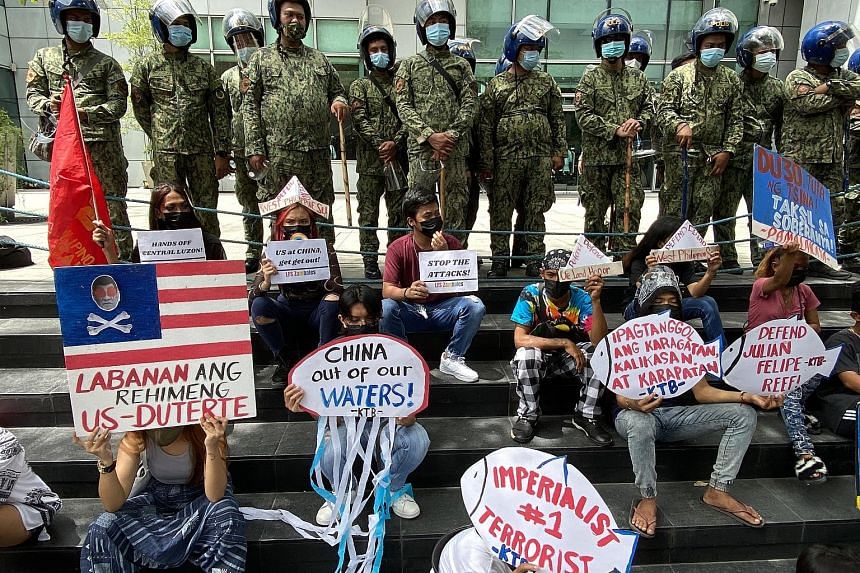Beijing furious after US warship sails near Chinese-controlled Paracel Islands in South China Sea
BEIJING – Beijing is furious after a US warship sailed near the Chinese-controlled Paracel Islands in the South China Sea on Monday (July 12), on the fifth anniversary of an international tribunal ruling that repudiated much of China’s territorial claims in the region.
The Chinese military said in a statement that the US guided missile destroyer USS Benfold “intruded into” Chinese territorial waters on Monday without permission from the Chinese government.
In a strongly worded statement, the People’s Liberation Army’s Southern Theatre Command spokesman, Colonel Tian Junli, said naval and air assets tracked and monitored the United States navy warship before “driving it away” with a warning.
Colonel Tian added that the incident was further “ironclad evidence of its (US) aggressive navigational hegemony and militarisation of the South China Sea”.
“We urge the US to immediately stop such provocative actions and strictly control maritime and air military activities, otherwise it will bear all resulting consequences,” he said.
In a statement later, the US Seventh Fleet rejected Beijing’s description about the USS Benfold’s mission, describing them as “false”.
It said the warship was challenging unlawful restrictions on innocent passage and China’s territorial claims.
“USS Benfold conducted this FONOP (freedom of navigation operation) in accordance with international law and then continued on to conduct normal operations in international waters… The United States will continue to fly, sail, and operate wherever international law allows, as USS Benfold did here. Nothing PRC says otherwise will deter us,” it added.
The Paracel Islands, known as the Xisha Islands in China and the Hoang Sa Archipelago in Vietnam, is a group of more than 30 islands claimed by China, Vietnam and Taiwan.
At the moment, Beijing currently has 20 outposts on the Paracel Islands, according to the Asian Maritime Transparency Initiative.
The US Navy regularly conducts freedom of navigation operations in the disputed waters of the South China Sea and its latest action comes on the fifth anniversary of the Permanent Court of Arbitration’s ruling that rejected much of Beijing’s claim to the waterway.
Just a day earlier, US Secretary of State Antony Blinken in a statement to mark the anniversary repeated the tribunal’s ruling that Beijing had “no lawful claim to the area”.
He warned that a Chinese attack on Philippine forces in the South China Sea would trigger a 1951 US-Philippines mutual defence treaty, while also reaffirming the former Trump administration’s policy rejecting Beijing’s maritime claims in the region.
Manila was the primary litigant in the 2016 tribunal ruling.
“The United States reaffirms its July 13, 2020, policy regarding maritime claims in the South China Sea,” Mr Blinken said.
“We also reaffirm that an armed attack on Philippine armed forces, public vessels, or aircraft in the South China Sea would invoke US mutual defence commitments under Article IV of the 1951 US-Philippines Mutual Defence Treaty,” he added.
In a separate statement, Philippine Foreign Affairs Secretary Teodoro Locsin said the tribunal’s ruling was final.
“We firmly reject attempts to undermine it; nay, even erase it from law, history and our collective memories. Anniversaries are an occasion to take stock of the past, mark the gains of the present, look to the future and find ways to work together for mutual benefit since no singular advantage can be gained by violating it,” he said.
Dr Collin Koh, a naval affairs specialist and research fellow at the S. Rajaratnam School of International Studies in Singapore, said Mr Blinken’s comments and the USS Benfold’s FONOP signalled there would no change in Washington’s policy on the South China Sea.
“The fifth anniversary (of the tribunal ruling) just happens to coincide with Biden’s first year in office, but the fact that this FONOP was conducted right on this very day is symbolic – the US wants to demonstrate that it will continue to challenge China’s excessive claims in the South China Sea,” he said.
Join ST’s Telegram channel here and get the latest breaking news delivered to you.
Source: Read Full Article



